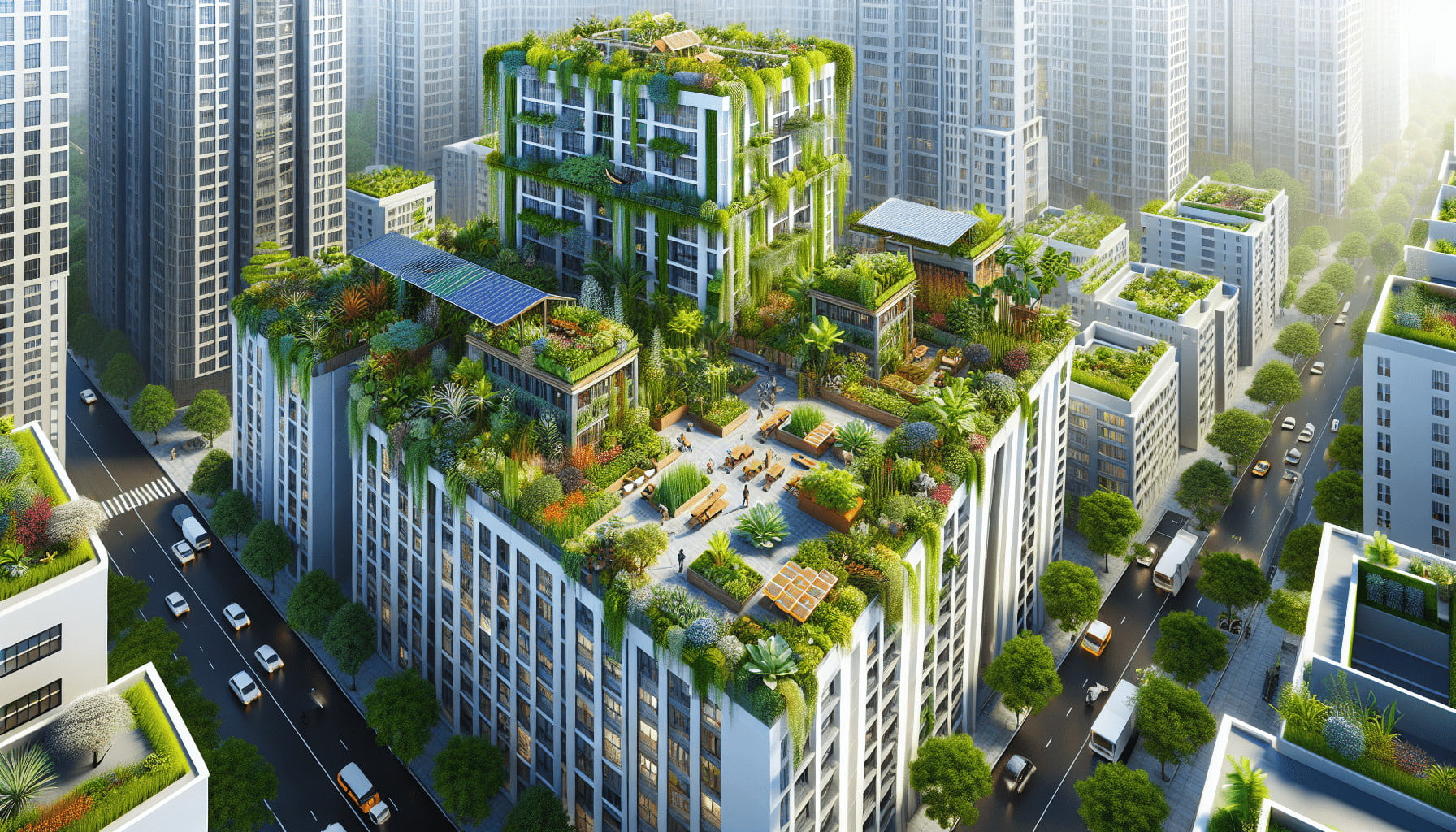Imagine escaping the hustle and bustle of city life by stepping onto a peaceful oasis right above your apartment. Rooftop gardening provides urban dwellers with a unique opportunity to create their own personal green space, filled with lush plants and vibrant flowers. But it’s not just about aesthetics; rooftop gardens offer a myriad of benefits. From improving air quality and reducing urban heat island effect to providing a source of fresh produce, the advantages of rooftop gardening are endless. Discover the transformative power of bringing nature to the urban jungle and unlock a whole new level of urban living with rooftop gardening.

Improving Air Quality
Reducing air pollution
One of the key benefits of rooftop gardening is its ability to reduce air pollution in urban areas. Plants in rooftop gardens absorb carbon dioxide and release oxygen through the process of photosynthesis, helping to decrease the levels of harmful greenhouse gases. By reducing air pollution, rooftop gardens contribute to cleaner air and a healthier environment for everyone.
Filtering out toxins
In addition to reducing air pollution, rooftop gardens also act as natural filters, absorbing various toxins and pollutants present in the air. Plants have the ability to remove harmful substances such as volatile organic compounds (VOCs), which can be found in products like paint and cleaning agents. These natural filters provided by rooftop gardens have a positive impact on air quality and can help to improve the health and well-being of urban dwellers.
Increasing oxygen production
By incorporating rooftop gardens into urban landscapes, we can significantly increase the oxygen production within cities. The abundance of plants in these green spaces leads to higher levels of oxygen, which is vital for human health. Increased oxygen levels can help to reduce stress, improve cognitive function, and enhance overall well-being. Rooftop gardens are a simple yet effective way to boost oxygen production and create a more breathable environment in urban areas.
Reducing Urban Heat Island Effect
Lowering ambient temperatures
Urban heat islands occur when densely built areas absorb and retain more heat than surrounding rural areas, resulting in elevated ambient temperatures. Rooftop gardens play a key role in cooling urban areas by shading rooftops and reducing the absorption of heat. The plants and soil in these gardens act as natural insulators, reducing the overall temperature of buildings. By lowering ambient temperatures, rooftop gardens help to create a more comfortable and pleasant urban environment for residents.
Reducing energy consumption for air conditioning
The cooling effect provided by rooftop gardens also has the added benefit of reducing energy consumption for air conditioning. By naturally lowering temperatures, buildings with rooftop gardens require less artificial cooling, leading to lower energy bills and a reduced strain on the electrical grid. This not only benefits individual buildings but also contributes to the overall energy efficiency of cities, making them more sustainable and environmentally friendly.
Mitigating the formation of smog
Rooftop gardens also play a crucial role in mitigating the formation of smog in urban areas. Smog is a type of air pollution caused by the interaction of sunlight with pollutants, such as nitrogen oxides and volatile organic compounds. The plants in rooftop gardens help to absorb and break down these pollutants, preventing their accumulation in the atmosphere. By reducing the formation of smog, rooftop gardens contribute to cleaner air and a healthier living environment for urban dwellers.
Enhancing Biodiversity
Providing habitat for birds, insects, and other wildlife
Rooftop gardens provide much-needed habitat for birds, insects, and other wildlife, especially in densely populated urban areas where green space is limited. These gardens act as valuable refuges for various species, offering food, shelter, and nesting opportunities. By creating mini ecosystems on rooftops, we can support biodiversity and help to preserve the natural balance of urban ecosystems.
Supporting pollinators
The decline of pollinators, such as bees and butterflies, is a global concern with far-reaching consequences for food production and ecosystem health. Rooftop gardens can act as sanctuaries for these important pollinators, providing them with a source of nectar and pollen. By supporting pollinators, rooftop gardens contribute to maintaining healthy ecosystems and ensuring the successful reproduction of many plant species, including those used in food production.
Preserving native plant species
Rooftop gardens offer an opportunity to preserve native plant species in urban environments. By incorporating local plants into these gardens, we can help to protect and promote the biodiversity of specific regions. Native plants are well adapted to local environmental conditions, making them resilient and less dependent on artificial inputs such as pesticides and fertilizers. By preserving native plant species, rooftop gardens contribute to the conservation of local ecosystems and help to maintain the unique character of each region.
Creating Green Spaces
Increasing access to nature
In many urban areas, access to nature is limited, with parks and green spaces often being scarce. Rooftop gardens provide an innovative solution by creating green spaces in otherwise underutilized areas. These gardens offer urban dwellers the opportunity to connect with nature, even in the midst of a bustling city. Access to nature has been linked to numerous health benefits, including reduced stress levels, increased physical activity, and improved mental well-being.
Improving mental health and well-being
The presence of green spaces, such as rooftop gardens, has a positive impact on mental health and overall well-being. Research has shown that spending time in nature can help to reduce symptoms of stress, anxiety, and depression. Rooftop gardens provide a peaceful sanctuary for urban dwellers, offering a break from the hustle and bustle of city life. The calming and restorative effects of these green spaces promote mental relaxation and contribute to a healthier and happier population.
Enhancing community cohesion
Rooftop gardens have the potential to bring communities together and enhance social cohesion. These green spaces provide shared areas where residents can come together, interact, and engage in various activities. Rooftop gardens can be designed as communal spaces with seating areas, community gardens, and even recreational facilities. By creating opportunities for social interaction and fostering a sense of belonging, rooftop gardens help to build strong communities and create a sense of shared ownership among urban dwellers.

Improving Food Security
Growing fresh produce in urban areas
One of the significant benefits of rooftop gardening is the ability to grow fresh produce in urban areas. By utilizing the space on rooftops, urban dwellers can cultivate a wide range of fruits, vegetables, and herbs. This promotes food security by reducing dependence on long-distance food transportation and increasing access to fresh, locally grown produce. Rooftop gardens also offer the opportunity to cultivate specific varieties that may be well-suited to local growing conditions, further contributing to food diversity and self-sufficiency.
Promoting sustainable and local food production
Rooftop gardens contribute to sustainable and local food production by minimizing the use of synthetic fertilizers and pesticides. These gardens can employ organic farming methods, reducing the environmental impact and potential health risks associated with conventional agriculture. By embracing sustainable practices, rooftop gardens promote a healthier and more resilient food system, providing urban dwellers with nutritious and safe food options.
Reducing reliance on long-distance food transportation
Transporting food over long distances contributes to greenhouse gas emissions and energy consumption. By growing food in urban areas through rooftop gardens, we can reduce the need for long-distance food transportation and its associated environmental impacts. Rooftop gardens provide a more sustainable alternative by bringing food production closer to consumers, minimizing the carbon footprint associated with the food supply chain, and increasing the resilience of urban food systems.
Managing Stormwater Runoff
Reducing strain on urban drainage systems
In urban areas, large amounts of rainwater can overwhelm drainage systems, leading to flooding and water contamination. Rooftop gardens help to alleviate the strain on urban drainage systems by absorbing and retaining rainwater. The plants and soil in rooftop gardens act as natural sponges, slowing down the flow of water and allowing it to gradually soak into the ground. By reducing the volume and intensity of stormwater runoff, rooftop gardens contribute to the overall resilience and efficiency of urban water management.
Minimizing the risk of flooding
Flooding is a significant concern in many urban areas, particularly during heavy rainfall events. Rooftop gardens play a crucial role in minimizing the risk of flooding by capturing and retaining rainwater. The plants and soil in these gardens act as a buffer, absorbing excess water and preventing it from overwhelming drainage systems. By capturing rainwater at its source, rooftop gardens reduce the volume of water entering the stormwater system and help to mitigate the risk of flood damage to buildings and infrastructure.
Filtering and purifying rainwater
Rainwater that is absorbed by rooftop gardens undergoes natural filtration and purification processes. The plants and soil in these gardens help to remove contaminants and pollutants present in the rainwater, improving its quality. This filtered rainwater can then be utilized for various purposes, such as irrigation or non-potable uses within the building. By filtering and purifying rainwater, rooftop gardens contribute to sustainable water management and reduce the demand for freshwater resources in urban areas.

Energy Efficiency
Providing insulation and reducing energy consumption for buildings
Rooftop gardens provide an additional layer of insulation for buildings, helping to reduce energy consumption for heating and cooling. The plants and soil act as natural insulators, keeping the building interior cooler in the summer and warmer in the winter. This thermal insulation decreases the need for artificial heating and cooling systems, resulting in energy savings and lower utility bills. By improving energy efficiency, rooftop gardens contribute to a more sustainable and environmentally friendly urban environment.
Reducing the urban heat island effect
As mentioned before, rooftop gardens play a significant role in reducing the urban heat island effect. By shading rooftops and lowering ambient temperatures, these gardens help to combat the excessive heat buildup in urban areas. The cooling effect provided by rooftop gardens reduces the need for air conditioning, consequently lowering energy consumption and reducing the heat island effect. By reducing the demand for energy-intensive cooling systems, rooftop gardens contribute to energy conservation and a more sustainable urban environment.
Lowering greenhouse gas emissions
Energy consumption in buildings contributes significantly to greenhouse gas emissions, primarily through the combustion of fossil fuels for heating and cooling purposes. Rooftop gardens help to lower greenhouse gas emissions by reducing the need for artificial heating and cooling. By utilizing natural insulation and reducing energy consumption, these gardens help to minimize the reliance on fossil fuel-based energy sources, leading to lower carbon dioxide emissions. Lowering greenhouse gas emissions is crucial for combating climate change and ensuring a sustainable future.
Noise Reduction
Absorbing and blocking urban noise
Urban areas are often characterized by high levels of noise pollution, which can have negative impacts on human health and well-being. Rooftop gardens can help to mitigate noise pollution by acting as natural sound barriers. The plants and soil in these gardens absorb and block urban noise, reducing its intensity and creating a more peaceful environment. Rooftop gardens located on higher floors can offer even greater noise reduction, providing a quiet retreat from the noise of the city below.
Improving acoustic insulation
In addition to absorbing and blocking external noise, rooftop gardens also contribute to improving acoustic insulation within buildings. The layers of soil and vegetation act as sound-absorbing materials, reducing the transmission of sound between floors and rooms. The presence of rooftop gardens can help to create a quieter indoor environment, enhancing the overall comfort and well-being of occupants. Improved acoustic insulation can also contribute to better concentration, productivity, and quality of life.
Creating a calming environment
The presence of green spaces, such as rooftop gardens, has a positive impact on mental well-being and can create a calming environment. The combination of nature, fresh air, and reduced noise levels helps to create a sense of tranquility in urban areas. Rooftop gardens provide a retreat from the busy and sometimes stressful city life, offering a peaceful and serene space for relaxation and reflection. The calming environment provided by these gardens promotes mental clarity and contributes to a healthier urban lifestyle.

Improving Rooftop Lifetime
Protecting roofing materials from UV radiation and extreme temperatures
Rooftop gardens provide an additional layer of protection for roofing materials, shielding them from the damaging effects of UV radiation and extreme temperatures. The vegetation and soil act as a barrier, absorbing the sun’s rays and preventing direct exposure to the roof surface. This protection helps to extend the lifespan of roofing materials, reducing the need for frequent repairs and replacements. By improving rooftop lifetime, rooftop gardens contribute to the long-term durability and sustainability of buildings.
Extending the lifespan of rooftops
The additional layer of insulation provided by rooftop gardens also helps to regulate temperature fluctuations, reducing the expansion and contraction of roofing materials. This stability and protection from extreme temperatures can significantly extend the lifespan of rooftops, minimizing the need for premature replacements. By preserving the integrity of rooftops, rooftop gardens help to reduce waste generation and the environmental impact associated with roof maintenance and replacements.
Reducing maintenance and replacement costs
By protecting roofing materials and extending their lifespan, rooftop gardens also contribute to significant cost savings for building owners. The reduced need for maintenance and replacements translates into lower expenses over time. Moreover, the insulating effect of rooftop gardens can also contribute to energy cost savings by reducing the demand for heating and cooling systems. By reducing maintenance and replacement costs, rooftop gardens provide a cost-effective solution for building owners while promoting sustainability and environmental stewardship.
Promoting Local Economy
Creating job opportunities in urban agriculture
Rooftop gardening creates job opportunities in the field of urban agriculture. The design, installation, and maintenance of rooftop gardens require a range of skills, from landscape architects and horticulturists to gardeners and irrigation specialists. By promoting rooftop gardening, cities can generate employment opportunities and support the growth of a thriving green economy. Job creation in urban agriculture not only contributes to the local economy but also encourages the development of sustainable and resilient food systems.
Supporting local businesses and farmers
Rooftop gardens have the potential to support local businesses and farmers by creating a demand for locally sourced products and services. As more rooftop gardens are established, the need for supplies such as plants, soil, and gardening tools increases. This demand can be met by local businesses and suppliers, boosting the local economy and encouraging entrepreneurship. Rooftop gardens also provide local farmers with additional outlets for their produce, supporting their livelihoods and strengthening the local food economy.
Boosting the local economy
By creating vibrant and thriving urban environments, rooftop gardens contribute to the overall economic prosperity of cities. The presence of rooftop gardens enhances the desirability and attractiveness of buildings, leading to increased property values and attracting businesses and investments. These green spaces create a unique selling point for urban areas, attracting residents, tourists, and businesses. Additionally, the creation of job opportunities in urban agriculture, as well as supporting local businesses and farmers, boosts the local economy and promotes sustainable growth.

